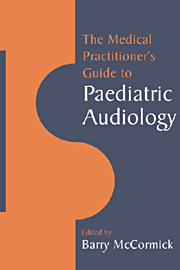Book contents
- Frontmatter
- Contents
- List of contributors
- Preface
- Acknowledgement
- 1 Introduction to hearing problems in childhood
- 2 Causes of deafness
- 3 Behavioural tests
- 4 Pure tone audiometry
- 5 Objective hearing tests
- 6 Middle-ear measurements
- 7 The management of otitis media with effusion
- 8 Management of unilateral hearing loss
- 9 Management of sensorineural hearing loss
- 10 Cochlear implants
- Index
3 - Behavioural tests
Published online by Cambridge University Press: 01 October 2009
- Frontmatter
- Contents
- List of contributors
- Preface
- Acknowledgement
- 1 Introduction to hearing problems in childhood
- 2 Causes of deafness
- 3 Behavioural tests
- 4 Pure tone audiometry
- 5 Objective hearing tests
- 6 Middle-ear measurements
- 7 The management of otitis media with effusion
- 8 Management of unilateral hearing loss
- 9 Management of sensorineural hearing loss
- 10 Cochlear implants
- Index
Summary
Behavioural hearing tests require the child to show an overt response to an auditory stimulus. The response may be a head turn or a play response such as putting a peg in a board. These tests give important information about the child's ability to detect and process sound, unlike objective techniques, which investigate different parts of the auditory pathway. For this reason, results from objective hearing tests should always be interpreted in the light of behavioural findings, to give an overall picture of how a child responds to sound.
The aim of paediatric behavioural testing is to determine, as accurately and reliably as possible, the presence and nature of any hearing impairment and the threshold of hearing across the important speech frequency range, from 500 Hz up to 4 kHz. The choice of test technique is based on the developmental age of the child, not necessarily the chronological age. Table 3.1 outlines the different test techniques and their ages for application. Behavioural audiological tests should always be accompanied by impedance measurements to investigate the status of the middle ear and the integrity of the acoustic reflex arc. (See Chapter 6 for further details of impedance measurements.)
Behavioural testing of children's hearing can be divided into the two separate but overlapping areas of auditory detection and auditory discrimination. Techniques involving auditory detection can be used from the age of a few weeks.
- Type
- Chapter
- Information
- The Medical Practitioner's Guide to Paediatric Audiology , pp. 16 - 30Publisher: Cambridge University PressPrint publication year: 1995



